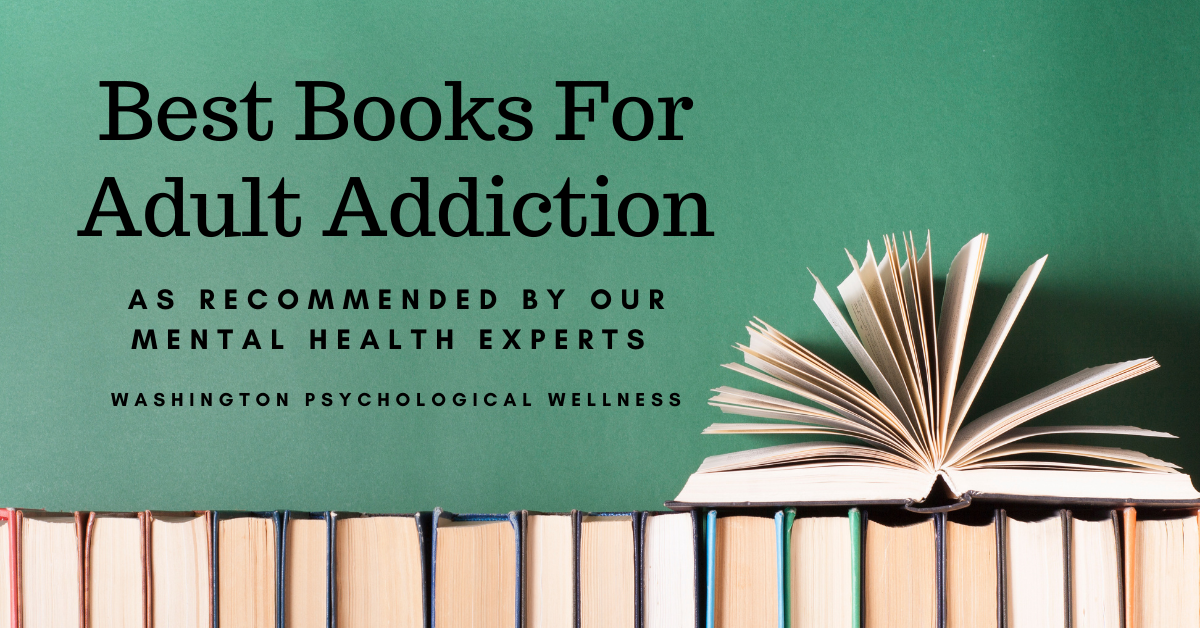
12 Best Books for Addiction
At Washington Psychological Wellness, a psychotherapy center in Gaithersburg, MD, we get asked the question all the time. What are the best books for addiction? Well, we asked our mental health clinicians and put together this list of recommended readings!
Want more recommended mental health book options? Check out our Books We Love section to discover a list of hand-picked resources!

The Addiction Recovery Workbook
By Paula A. Freedman
Best Books for Adult Addiction
Summary
Prevent relapse with practical, everyday coping skills
Get the tools you need to recover from alcoholism and other forms of addiction. This substance abuse workbook equips you with actionable strategies and coping techniques to succeed in recovery when faced with daily challenges, stressors, and triggers.
From navigating intimate relationships to handling high-risk situations and environments, this addiction workbook offers practical tools and hands-on exercises that you can use in your home, work, and personal life.
Develop addiction recovery skills through:
- A comprehensive introduction that helps you understand your addiction and outlines the path to recovery.
- Coping skills to deal with thoughts, emotions, relationships, and high-risk situations and environments.
- Prevention tactics that help you succeed in lifelong recovery by setting new, addiction-free lifestyle habits and routines.
Foster the skills you’ll need to persevere with this addiction recovery workbook as your guide.

The Food Addiction Recovery Workbook
By Carolyn Coker Ross
Best Books for Adult Addiction
Summary
Isn’t it time you got off the diet treadmill? In The Food Addiction Recovery Workbook, physician Carolyn Coker Ross offers the proven-effective Anchor Program™ to help you curb cravings, end body dissatisfaction, manage stress and emotions without food, and truly satisfy your soul.
When it comes to addiction, abstinence isn’t always the answer—and with food addiction, this is especially true. And yet, for decades, nutritional experts have dissected the problem of obesity, and the result has been a series of recommendations about what and how much to eat. When “eating too much fat” was thought to cause obesity, grocery store shelves exploded with low-fat products. Next came the low-carb craze that led us to fear eating all carbohydrates, and with it came another assortment of fad products and diets. This pattern has been repeated numerous times—and it never seems to be helpful!
If you’re struggling with obesity or food addiction, you’ve probably been told that you must deprive yourself of certain foods in order to lose weight. You may have also been convinced—by the media and by our culture—that if you finally become thin your life will be better, you’ll be happier, and your suffering will come to an end. The problem is—it’s not all about the food. It’s about how food is used to self-soothe, to numb ourselves against the pain of living or to cope with stress and unresolved emotions. Even as your waist whittles away, the problems that caused your food addiction won’t disappear.
The Anchor Program™ approach detailed in this workbook is not about dieting. It’s about being anchored to your true, authentic self. When you find your unique anchor, you will relate better to your body, you will know intuitively how to feed your body, and you will reach the weight that’s right for you. Anyone who’s been on the diet treadmill—losing and regaining lost weight—will admit that losing weight doesn’t instantly bring health or happiness. That’s because losing weight is a red herring for the real issue, the misuse of food to solve a problem that has nothing to do with food.
This book offers a whole-person approach that blends practical information on managing stress and regulating emotions without relying on food. If you’re ready to uncover the true cause of your food addiction, you’ll finally be able to embrace a balanced diet and reach the weight that’s right for you.
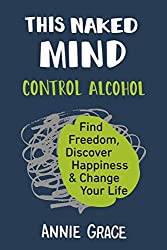
This Naked Mind
By Annie Grace
Best Books for Adult Addiction
Summary
This Naked Mind has ignited a movement across the country, helping thousands of people forever change their relationship with alcohol.
Many people question whether drinking has become too big a part of their lives, and worry that it may even be affecting their health. But, they resist change because they fear losing the pleasure and stress-relief associated with alcohol, and assume giving it up will involve deprivation and misery.
This Naked Mind offers a new, positive solution. Here, Annie Grace clearly presents the psychological and neurological components of alcohol use based on the latest science, and reveals the cultural, social, and industry factors that support alcohol dependence in all of us. Packed with surprising insight into the reasons we drink, this book will open your eyes to the startling role of alcohol in our culture, and how the stigma of alcoholism and recovery keeps people from getting the help they need. With Annie’s own extraordinary and candid personal story at its heart, this book is a must-read for anyone who drinks.
This Naked Mind will give you freedom from alcohol. It removes the psychological dependence so that you will not crave alcohol, allowing you to easily drink less (or stop drinking). With clarity, humor, and a unique blend of science and storytelling, This Naked Mind will open the door to the life you have been waiting for.
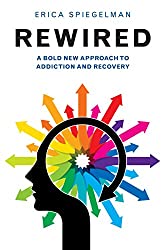
Rewired
By Erica Spiegelman
Best Books for Adult Addiction
Summary
An addiction expert introduces a revolutionary and empowering approach to addiction recovery that addresses the whole self—mind, body, and spirit
Rewired is a new, breakthrough approach to fighting addiction and self-damaging behavior by acknowledging our personal power to bring ourselves back from the brink. Centered on the concept of self-actualization, Rewired will guide you towards not only physical sobriety, but a mental, emotional, and spiritual sobriety by learning to identify key principles within yourself, including authenticity, honesty, gratitude, and understanding a need for solitude.
Rewired addresses the whole self; just as addiction affects every part of one’s life, so too must its treatment. By helping us to build a healthy space to support our own recovery, we can rewrite the negative behaviors that result in addiction. Usable in conjunction with or in place of 12-step programs, Rewired allows for a more holistic approach, helping to create a personalized treatment plan that is right for you.
Each section in Rewired includes:
• Personal anecdotes from the author’s own struggles with alcoholism and addiction
• Inspiring true success stories of patients overcoming their addictions
• Questions to engage you into finding what is missing from your recovery
• Positive affirmations and intentions to guide and motivate
With all the variables, both physical and emotional, that play into overcoming addiction, Rewired enables us to stay strong and positive as we progress on the path to recovery. Rewired teaches patience and compassion, the two cornerstones of a new, humanist approach to curing addiction. Remember, addicts are not broken people that need to be fixed—they just have a few crossed wires.
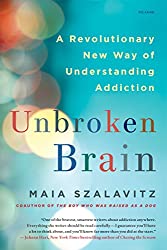
Unbroken Brain
By Maia Szalavitz
Best Books for Adult Addiction
Summary
More people than ever before see themselves as addicted to, or recovering from, addiction, whether it be alcohol or drugs, prescription meds, sex, gambling, porn, or the internet. But despite the unprecedented attention, our understanding of addiction is trapped in unfounded 20th century ideas, addiction as a crime or as brain disease, and in equally outdated treatment.
Challenging both the idea of the addict’s “broken brain” and the notion of a simple “addictive personality,” Unbroken Brain offers a radical and groundbreaking new perspective, arguing that addictions are learning disorders and shows how seeing the condition this way can untangle our current debates over treatment, prevention and policy. Like autistic traits, addictive behaviors fall on a spectrum — and they can be a normal response to an extreme situation. By illustrating what addiction is, and is not, the book illustrates how timing, history, family, peers, culture and chemicals come together to create both illness and recovery- and why there is no “addictive personality” or single treatment that works for all.
Combining Maia Szalavitz’s personal story with a distillation of more than 25 years of science and research, Unbroken Brain provides a paradigm-shifting approach to thinking about addiction.
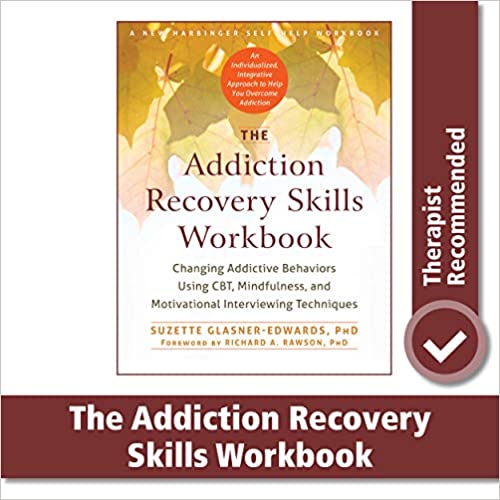
The Addiction Recovery Skills Workbook
By Suzette Glasner-Edwards
Best Books for Adult Addiction
Summary
Is your addiction taking control of your life? This book provides an integrative, seven-step program to help you finally overcome drug and alcohol addiction, once and for all.
If you struggle with addiction, seeking treatment is a powerful, positive first step toward eventual recovery. But gaining an understanding of the causes of addiction—such as feelings of helplessness or loss of control—is also crucial for recovery. In this book, addiction expert Suzette Glasner-Edwards offers evidence-based techniques fusing cognitive behavioral therapy (CBT), motivational interviewing, and mindfulness-based relapse prevention to help you move past your addictive behaviors.
On the long road to addiction recovery, you need as many tools as possible to help you stay sober and reach your destination. That’s why this is the first book to combine research-proven motivational techniques, CBT, and mindfulness-based strategies to help you create your own unique recovery plan. The book can be used on its own or as an adjunct to rehab or therapy. It also makes a wonderful resource for loved ones and professionals treating addiction.
If you’re ready to take that important first step toward recovery, this book can help you beat your addiction and get back to living a full, meaningful life.
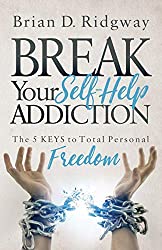
Break Your Self-Help Addiction
By Brian D. Ridgway
Best Books for Adult Addiction
Summary
What if self-improvement is a booby-trap? And what if there is actually a way to change one’s life—in all areas, all at once—by finding and shifting the one hidden issue that has been creating all of the stuckness all along?
Coming out of an abusive childhood and then living with the outcomes of that ongoing pain, Brian D. Ridgway invested over $300,000 and tens of thousands of hours over thirty-plus years on self-help, personal development, and business/money/success courses—as his life got worse and worse.
Finding himself in desperate circumstances, suicidal and stuck, he experienced an awakening that took him from homeless to living the dream in Hawaii in less than ninety days. In that awakening, he was given the Level 5 Paradigm. Since that “miracle moment,” he has been able to help people around the world to take their first steps into true freedom—and in this book, he tells his story.
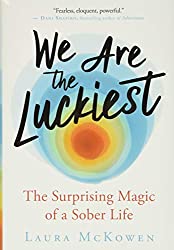
We Are The Luckiest
By Laura McKowen
Best Books for Adult Addiction
Summary
What could possibly be “lucky” about addiction? Absolutely nothing, thought Laura McKowen when drinking brought her to her knees. As she puts it, she “kicked and screamed . . . wishing for something — anything — else” to be her issue. The people who got to drink normally, she thought, were so damn lucky.
But in the midst of early sobriety, when no longer able to anesthetize her pain and anxiety, she realized that she was actually the lucky one. Lucky to feel her feelings, live honestly, really be with her daughter, change her legacy. She recognized that “those of us who answer the invitation to wake up, whatever our invitation, are really the luckiest of all.”
Here, in straight-talking chapters filled with personal stories, McKowen addresses issues such as facing facts, the question of AA, and other people’s drinking. Without sugarcoating the struggles of sobriety, she relentlessly emphasizes the many blessings of an honest life, one without secrets and debilitating shame.
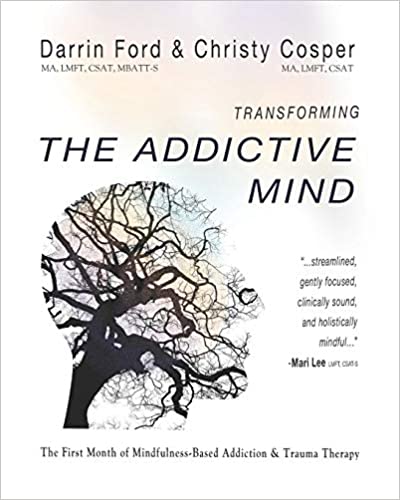
The Addictive Mind
By Darrin Ford & Christy Cosper
Best Books for Adult Addiction
Summary
With over 20 years of experience between them, clinical therapists Christy Cosper and Darrin Ford have poured their expertise and personal discoveries into a book designed for healing and growth from addictive behaviors. Steeped in science and grounded in mindfulness, the authors have written a workbook for the addict that examines the poison of addiction, offers antidotes, and raises awareness of the self. Written in both the first and third person, Transforming the Addictive Mind contains a variety of voices who have treated and struggled through addiction. The exercises, meditative activities, case studies, and personal stories are written simply enough to follow while having the elements needed to foster honesty, compassion, and gentleness with one’s self and relationship to others.
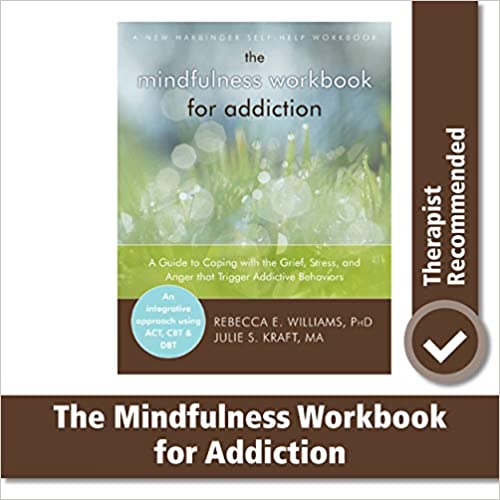
The Mindfulness Workbook for Addiction
By Rebecca E. Williams & Julie S. Kraft
Best Books for Adult Addiction
Summary
Most addictive behavior is rooted in some type of loss, be it the death of a loved one, coming to terms with limitations set by chronic health problems, or the end of a relationship. By turning to drugs and alcohol, people who have suffered a loss can numb their grief. In the process, they postpone their healing and can drive themselves further into addiction.
The Mindfulness Workbook for Addiction offers readers an effective program for working through their addiction and grief with cognitive behavior therapy (CBT), dialectical behavior therapy (DBT), and acceptance and commitment therapy (ACT). Created by a psychologist who works for the Department of Veterans Affairs and a marriage and family therapist who works for Sharp Mesa Vista Hospital, this mindfulness training workbook is effective for treating the emotion dysregulation, stress, depression, and grief that lie at the heart of addiction. No matter the loss, the mindfulness skills in this workbook help readers process their grief, determine the function their addiction is serving, and replace the addiction with healthy coping behaviors.
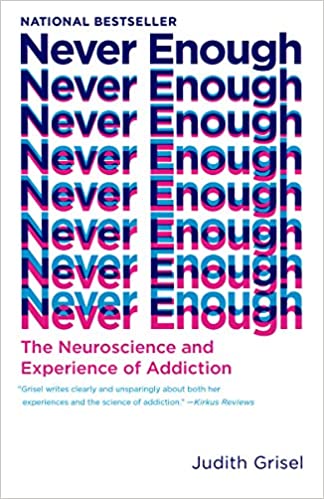
Never Enough: The Neuroscience and Experience of Addiction
By Judith Grisel
Best Books for Adult Addiction
Summary
From a renowned behavioral neuroscientist and recovering addict, a rare, page-turning work of science that draws on personal insights to reveal how drugs work, the dangerous hold they can take on the brain, and a surprising way to combat today’s epidemic of addiction.
Judith Grisel was a daily drug user and college dropout when she began to consider that her addiction might have a cure, one that she herself could perhaps discover by studying the brain. Now, after twenty-five years as a neuroscientist, she shares what she and other scientists have learned about addiction, enriched by captivating glimpses of her personal journey.
In Never Enough, Grisel reveals the unfortunate bottom line of all regular drug use: there is no such thing as a free lunch. All drugs act on the brain in a way that diminishes their enjoyable effects and creates unpleasant ones with repeated use. Yet they have their appeal, and Grisel draws on anecdotes both comic and tragic from her own days of using as she learns the science behind the love of various drugs, from marijuana to alcohol, opiates to psychedelics, speed to spice.
Drug abuse has been called the most formidable health problem worldwide, and Grisel delves with compassion into the science of this scourge. She points to what is different about the brains of addicts even before they first pick up a drink or drug, highlights the changes that take place in the brain and behavior as a result of chronic using, and shares the surprising hidden gifts of personality that addiction can expose. She describes what drove her to addiction, what helped her recover, and her belief that a ‘cure’ for addiction will not be found in our individual brains but in the way, we interact with our communities.
Set apart by its color, candor, and bell-clear writing, Never Enough is a revelatory look at the roles drugs play in all of our lives. It offers crucial new insights into how we can solve the epidemic of abuse.
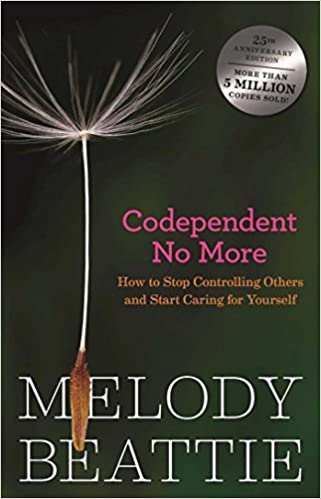
Codependent No More
By Melody Beattie
Best Books for Adult Addiction
Summary
In a crisis, it’s easy to revert to old patterns. Caring for your well-being during the coronavirus pandemic includes maintaining healthy boundaries and saying no to unhealthy relationships.
The healing touchstone of millions, this modern classic by one of America’s best-loved and most inspirational authors holds the key to understanding codependency and to unlocking its stultifying hold on your life.
Is someone else’s problem your problem? If like so many others, you’ve lost sight of your own life in the drama of tending to someone else’s, you may be codependent–and you may find yourself in this book–Codependent No More. The healing touchstone of millions, this modern classic by one of America’s best-loved and most inspirational authors holds the key to understanding codependency and to unlocking its stultifying hold on your life.
With instructive life stories, personal reflections, exercises, and self-tests, Codependent No More is a simple, straightforward, readable map of the perplexing world of codependency–charting the path to freedom and a lifetime of healing, hope, and happiness.
Melody Beattie is the author of Beyond Codependency, The Language of Letting Go, Stop Being Mean to Yourself, The Codependent No More Workbook, and Playing It by Heart.
About Washington Psychological Wellness
At Washington Psychological Wellness, our therapists have extensive training, experience, and insights to treat a wide variety of addictions. Our therapists treat relationship addiction and love addiction and can help you overcome substance abuse, drug abuse, alcohol addiction, or mood disorders that correlate to an addiction. Addiction treatment might also involve learning stress management or anger management techniques.
Addiction Therapy at Washington Psychological Wellness can also include treatment modalities such as cognitive-behavioral therapy, dialectical behavioral therapy, or crisis intervention therapy. As your therapist for addiction and other disorders, the treatment team at Washington Psychological Wellness will find a way to help you overcome your addiction and regain your quality of life and health.
Ready to seek addiction counseling?
Contact us now to schedule your complimentary 15-minute initial consultation. Telehealth (online) therapy options are available.
